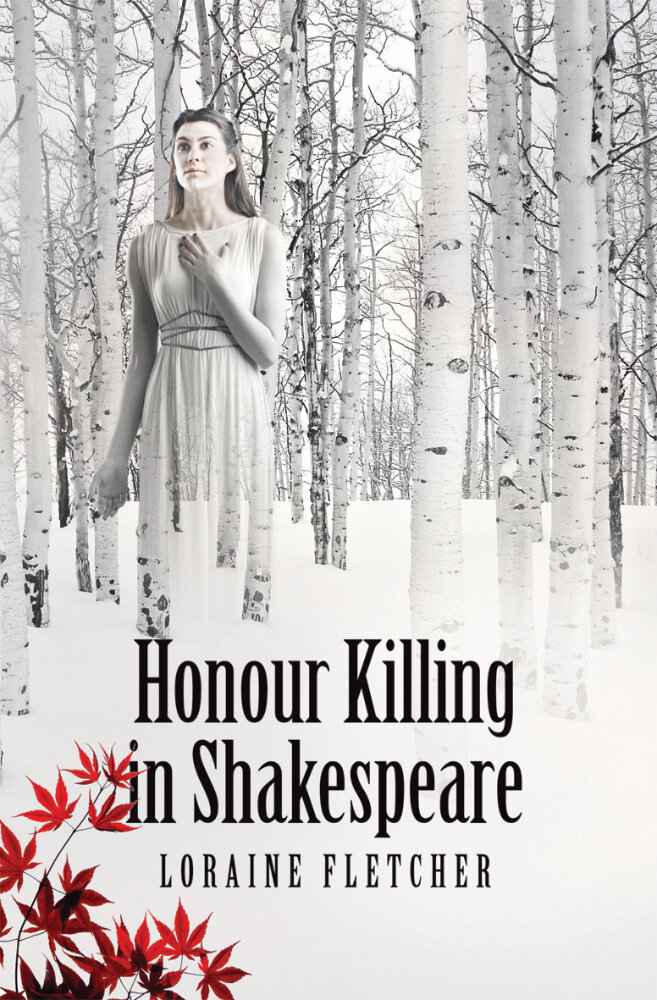Honour Killing in Shakespeare
‘I admire Honour Killing in Shakespeare very much; it is passionate and focussed, but also manages to be usefully digressive, relating its central topic to all sorts of other insights and perspectives. Our students, present and future, will be grateful too.’
Professor Michael Dobson ~ Director, The Shakespeare Institute
Honour Killing in Shakespeare is written with a vernacular spring and swing, studded with sidelong glances at film and TV adaptations, and at cultural icons from Quentin Tarantino to Hilary Mantel and the Carry On movies … Fletcher cites major recent landmarks in feminist and genderconscious criticism but keeps her eye on the engaged lay reader. Not only students but actors, too, would benefit greatly from her matter and manner alike.
In Fletcher’s treatment, the honour-killing theme begins in plays where the accusation, defence, and trial of a blameless woman for alleged offences against chastity powers much of the action.
That this primary group spans such a wide arc of genres signposts her willingness to straddle critical fences, and seek affinities in mood, voice and character rather than a strict kinship of form. If Desdemona dies, Hero, Imogen, and Hermione survive symbolic deaths thanks to ‘the genius of comedy.’ Milder waves of the same theme roll through the Henry VI plays (from Joan of Arc to Eleanor Cobham), Richard III, and All Is True (where Anne Boleyn will succumb to ‘England’s royal honour-killer’). Fletcher takes Ovid’s tale of raped Philomel as key to the cycles of violence against women and the quest for restitution shown in The Rape of Lucrece, Titus Andronicus, and even A Midsummer Night’s Dream. Titus, that ‘great cry of outrage against human cruelty’ that still baffles ‘all humanist criticism’ makes a strong showing here … When honour, rape and revenge motifs resurface in A Midsummer Night’s Dream, she effectively exposes the murky, savage undergrowth of the wood near Athens, and makes the case for Titus as ‘dark obverse’ of the Dream’s apparently ‘sunny narrative tapestry’. Such knight’s leaps punctuate and elevate the book.
Some arbiters will deem Honour Killing in Shakespeare a reader-friendly throwback to the character criticism of past eras. In fact, Fletcher balances character-driven scrutiny with a keen morphological sense of how similar material … can mutate into wholly different outcomes across the plays.
Referring to Shakespeare’s endless appropriation by rival systems, schools, and creeds, she notes that ‘everyone takes a free ride on his voluminous cloak.’ She has thoroughly earned hers.
Boyd Tonkin ~ Benson Medal, 2020, Hon. FRSL. Shakespeare Quarterly
Some of Fletcher’s most interesting observations concern post-Reformation politics and Succession … The (knowingly) unrelated digression about The Merchant of Venice – arguing that the violent conflict between Jews and Christians shone a light on contemporary antagonism between Catholics and Protestants – is compelling.
Molly Clark ~ The Times Literary Supplement
Loraine Fletcher grew up on the Friday Hill Estate in Chingford and went to Woodford County High and Reading University. She has taught all her professional life in schools, as a private tutor, at Stanford University’s base in England and most recently in the English Department of Reading University. She is the author
of a critical biography of the 18th-century poet and novelist Charlotte Smith, and of many academic articles, and has edited two Smith novels. For 25 years she reviewed regularly for The Guardian, The New Statesman and The Independent. Her memoir, Print/Capture, is available on the internet.
Loraine Fletcher - Why I Had To Write Honour Killing in Shakespeare
350 pages
ISBN: 978-1-910996-26-3

